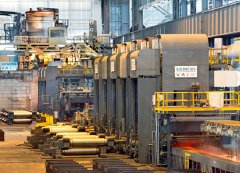In June 2009 industrial production in the endless mode commenced at the new Arvedi ESP (Endless Strip Production) line in Cremona, Italy. For the first time ever, hot-rolled coils can now be commercially produced in a thin-slab casting/rolling plant directly from liquid steel in a continuous and uninterrupted manufacturing process. This plant, based on Arvedi technology and implemented by Siemens VAI Metals Technologies, allows the thermal energy of liquid steel to be fully exploited.
Thin-gauge strip is produced in better quality and at lower costs compared to alternative processes. This new casting-rolling facility represents the world's most compact line for the production of hot-rolled strip.
 Start of endless strip production at the Arvedi ESP line of Acciaieria Arvedi Cremona, Italy
Start of endless strip production at the Arvedi ESP line of Acciaieria Arvedi Cremona, Italy
The nominal capacity of the new production facility will exceed two million tons of hot-rolled coils per year. Strip can be produced in widths of up to 1,600 millimeters and at thicknesses down to 0.8 mm. The thin and ultrathin gauges can be immediately used in numerous downstream applications. The line has an overall length of only 190 meters, which is less than one-half of the length of a typical hot-strip mill without casting and storage facilities. All standard carbon-steel grades can be rolled, in addition to HSLA (high-strength, low alloy) and multi-phase steel grades. Products from the Arvedi ESP line are suitable for use in the automotive, appliance and building industries, as well as for the production of tubes, profiles, machinery and mechanical equipment.
Thanks to the endless strip-production mode, repeated threading into the individual rolling stands is no longer necessary. This is the basis for the production of ultra-thin gauges in ESP lines. Furthermore, tolerance values are fully met along the entire length of the rolled strip and the produced steel is characterized by its high surface quality and homogeneous structure. The strip is under continuous tension, eliminating the danger of cobbling due to high speeds and insufficient strip-head stability. Overall yield is maximized because cropping of the strip head and tail ends is no longer necessary. Strip cutting is carried out just before the downcoilers.
Energy requirements are significantly reduced compared with conventional lines. Online energy measurements have shown a 45 percent reduction in the energy consumption compared to conventional casting and rolling processes, creating additional value for producers. Less energy requirements also means a major reduction in CO2 emissions.
The Arvedi ESP line is equipped with a broad range of advanced technological features and systems. These include technological packages such as liquid-core reduction and DynaGap SoftReduction to ensure best internal strand quality. The caster is directly connected to a 3-stand high-reduction mill, equipped with AGC (automatic gauge control) and profile control. On the basis of the individual control setpoints, the transfer strip is thermally equalized in the induction heater with flexible heating up to temperatures in a range from 1,100°C to 1,200°C. Three of the finishing-mill stands are equipped with SmartCrown rolls to ensure a high degree of strip flatness. AGC and other control features are installed in all mill stands. After exiting the final rolling stand, the strip is cooled by a laminar-cooling system which allows the mechanical properties of the strip to be adjusted as required. After cutting the strip by means of a high-speed shear, the strip is coiled in one of the three downcoiler units. The individual coils can have a weight of up to 32 tons.
The entire line is controlled by completely integrated Level 1 and Level 2 automation systems, which fully regulate all casting and rolling operations. This is complemented by a plant-wide quality-control system, which assures that the required quality standards are met.